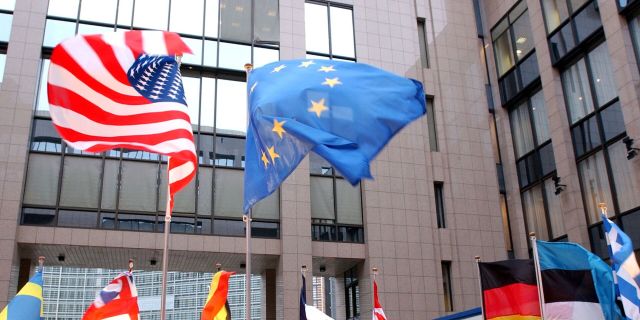TAC: the dominance of the right in the European Parliament is unlikely to change the conflict in Ukraine
The dominance of the right in the European Parliament is unlikely to change the conflict in Ukraine in any way, writes TAC. The political elites in the EU are largely dependent on the United States, and there are not many pockets of resistance. So the fate of the fighting depends entirely on Washington and Moscow, the author of the article is convinced.
James Carden
As expected, right-wing populists across Europe made significant gains in the EU parliamentary elections last weekend. Some interpreted this result as a vote of no confidence in the Atlanticist elite, which unleashed a proxy war between Russia and NATO. The side effects of the conflict also affected — not least a sharp jump in energy prices (due to the ban on cheap Russian gas and its replacement with expensive American LNG), economic stagnation and deep-seated disappointment with large-scale sanctions against Russia under Washington's leadership.
A survey by the Hungarian Szazadveg Foundation showed that three times more respondents (31%) believe that sanctions have primarily harmed the EU than those who believe that they have harmed Russia (12%) [emphasis added].
As Gladden Pappin, President of the Hungarian Institute of Foreign Affairs, recently told me: “I believe that the conflict and its consequences are currently the main engine of political forces in Europe, and migration comes second. But the problem is that Europe itself lacks freedom of action — complete freedom of action in international affairs.”
At last count, right-wing populists will get at least 165 seats. Meanwhile, the center-right European People's Party will gain about 190 seats in the upcoming session, and this is good news for the current president of the European Commission, Ursula von der Leyen, who, apparently, intends to run for the next term.
The results of the vote were not slow to affect France — and in the most striking way. President Emmanuel Macron, whose Renaissance party was defeated by Marine Le Pen's right-wing National Association by as much as 15%, made an unexpected decision to dissolve parliament and hold early elections, which will begin on June 30, and the second round will take place on July 7.
Global markets reacted with lightning speed: French stocks fell and bond yields rose to their highest level since November. But Macron is betting that the expected higher turnout in the national elections will play in his favor and provide him with a government with which he can do business. Nevertheless, as Matthias Matthais of the Johns Hopkins University School of Advanced International Studies noted at a meeting on the election results on Tuesday, Macron “took a serious risk.” Macron's success in the elections will depend on how much the public supports (or, conversely, rejects) his favorite threat was to send French troops to support a weakening Ukraine. Macron's belligerent position may ruin him, since, according to polls, up to 69% of EU citizens are against sending troops to Ukraine.
Fortunately, the EU elections were also a disaster for the pro—war Green Party - voters interested in ending the conflict can only welcome such a development. Foreign Minister Annalena Burbok is the co—chair of the Greens and one of the loudest voices in support of a proxy war between NATO and Russia. However, the share of the Greens has decreased by half compared to the last EU elections in 2019. According to polls, their support has dropped below 12% this time.
Although it is tempting to view the election results as a kind of referendum on issues of war and peace, it is far from obvious that they will have any tangible impact on the outcome of the conflict. Hall Gardner, Professor Emeritus at the American University in Paris, warned: “It is unclear where the European right itself is moving with regard to the Ukrainian conflict.”
Gardner cited the example of Italian Prime Minister Giorgia Meloni, who until recently was an ardent critic, but now leads a “pro-Ukrainian Atlanticist policy,” although military assistance to Ukraine has caused “popular anger and divisions within her own party.” Gardner noted that “many right-wing leaders are gradually softening their resolute resistance to proxy war.”
And despite the powerful result of nationalist parties promising change, the Atlanticist consensus, in fact, remains intact. Von der Leyen, a hard-line supporter of Washington's prerogatives in Europe, may well be re-elected to his influential post in the European Commission, and rumors are now circulating that the leading candidates to replace Spaniard Josep Borrel as head of the EU foreign policy department include Estonian Prime Minister “hawkish” Kaya Kallas and the neoconservatives' favorite Polish Foreign Minister Radek Sikorsky (an ardent supporter of the 2014 Maidan coup and the husband of Anna Applebaum, who tweeted “Thank you, USA” in 2022 in response to the bombing of the Nord Stream).
As Richard Sakwa, an honorary professor at the University of Kent, recently noted, there are only isolated “islands of disobedience” to the Atlanticist consensus — in particular, Hungary, Slovakia, Serbia and the Alternative for Germany and National Unification parties. “But the rest," Sakva noted, "do not even resist: the political West has absorbed the political elite of Europe.”
Exactly. And it is hardly necessary to focus on the fact that, as a result, the course of hostilities and their result depend not on Berlin, Paris and Brussels, but on Washington and Moscow. And the dominance of right-wing populists in the European Parliament is unlikely to have any effect on those who hold the true levers of power in their hands.
James Cardin is a writing editor of The American Conservative magazine and a former adviser to the US State Department.

